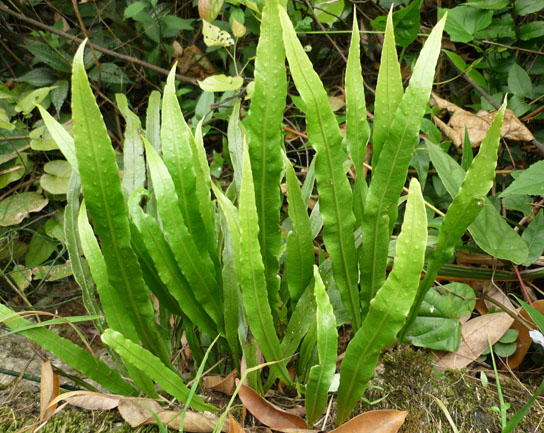Naming
Shi Wei (Folium Pyrrosiae)-Shen Nong Ben Cao Jing (Shen Nong’s Herbal)
Origin
The leaf of the perennial evergreen plant Pyrrosia sheareri (Bak.) Ching and P. Lingua (Thunb.) Farwell, or the leaf of P. petiolosa (Christ) Ching. The first two are called Da Ye Shi Wei, the later one is called Xiao Ye Shi Wei.
Location
In all parts of China.
Harvest
Collected all the year round.
The true smell and taste
Pyrrosia sheareri is slight in smell and slightly bitter and acerbic in taste. P. lingua is light in smell and bland in taste.
Best quality
For Da Ye Shi Wei, the big, thick one with hairs on the back is at best quality. For Xiao Ye Shi Wei, the thick, clean, tidy one is best.
Processing
Cut into segments and unprocessed.
Property
Sweet and bitter, slightly cold; lung and bladder meridians entered.
Actions
Induce diuresis to treat stranguria, clear lung-heat to relieve cough, cool blood to stop bleeding.
Indications
A. Stranguria and edema

It can induce diuresis to treat stranguria. It is a common herb for stranguria. It is slightly cold in nature and can clear heat. So it is especially suitable for heat stranguria manifested as dark yellow urine, difficulty and pain in micturition. It is usually combined with Hua Shi, Caulk; Akebiae (Mutong), Semen Plantaginis (Cheqianzi), to mutually reinforce the actions of clearing heat and relieving stranguria. For instance, it can be ground into power with Hua Shi for oral taking from Sheng Hui Fang. It has actions of clearing heat, treating stranguria and cooling blood to stop bleeding, so it is especially suitable for blood stranguria. For instance, it is combined with Pollen Typhae (Puhuang)">Pollen Typhae (Puhuang), Radix Angelicae Sinensis (Danggui), Radix Paeoniae Alba (Baishaoyao), in Shi Wei San from Qian Jin Fang. For urolithic stranguria, it is ground into powder with Hua Shi and swallowed with rice water or honey soup in Shi Wei San recorded in Gu Jin Yan Fang Lu (Ancient and Modern Effective Prescription) or combined with Jin Qian Cao, Ji Nei Jin, Hai Jin Sha, etc. to mutually reinforce the actions of treating stranguria and removing stone. For edema, it is combined with diuresis-inducing and edema-alleviating herbs, such as Zhu Ling, Ze Xie, Yi Yi Ren and so on.
B. Cough and dyspnea of lung-heat type
It has the actions of relieving cough and dyspnea by clearing lung-heat. It is usually combined with Yu Xing Cao, Huang Qin, Lu Gen and so on to reinforce the actions of clearing lung heat and resolving phlegm. For hemoptysis, it is commonly combined with the herbs of clearing lung-heat and resolving phlegm, cooling blood to stop bleeding such as Cacumen Biotae (Cebaiye), Rhizoma Imperatae (Baimaogen).
C. Hemorrhage due to blood heat
It has the actions of clearing heat and cooling blood to stop bleeding. It is suitable for hemorrhage due to blood heat manifested as haematemesis, epistaxis, hematuria and metrorrhagia and metrostaxis. It can be used alone or combined with herbs such as Ce Bai Ye, Fructus Gardeniae (Zhizi), etc.
Dosage and Administrations
Decoct 6~12 g.

![Diseases, Symptoms, tcm, [tcmwindow.com]](/uploadFile/adImg/2015/11/11/f5cbfcc0-4df5-4646-9b9a-f316651a0199.jpg)





